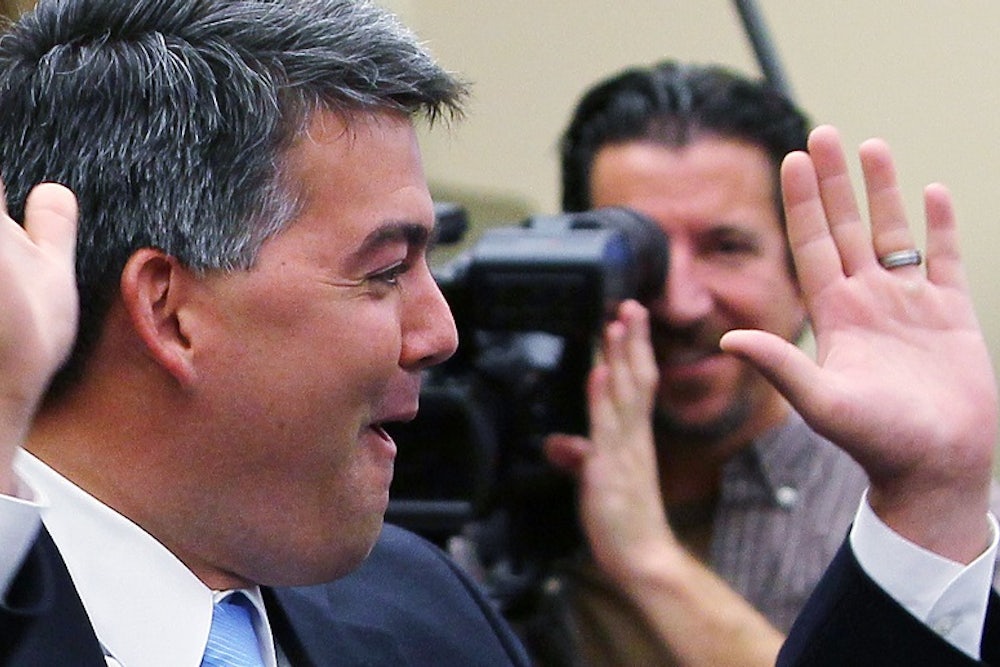On Friday, the Denver Post endorsed Representative Cory Gardner, a Republican, in his very tight Senate race against incumbent Democrat Mark Udall. This was unexpected. The Denver Post endorsed Udall in 2008, Democratic Senator Michael Bennet in 2010, and President Obama in both 2008 and 2012. This is a big blow to the Udall campaign—and to Democrats’ hopes of keeping the Senate—but it's also baffling, because the Post doesn’t agree with Gardner on almost any issue.
The paper's editorial board credits Udall for his work on spying and NSA issues and admits “we strongly disagree with [Gardner] on same-sex marriage and abortion rights,” then waves away those disagreements by saying Gardner isn’t a culture warrior and that same-sex marriage’s recent string of court victories has made his position “irrelevant.” The board also criticizes Udall for running an "obnoxious one-issue campaign"—"trying to convince voters that Gardner seeks to outlaw birth control despite the congressman's call for over-the-counter sales of contraceptives"—and naively argues that a Republican Senate could revive bipartisanship in Washington.
But the Post board errs the greatest in claiming that its position on major issues is closer to Gardner's platform than Udall's. A cursory review of editorials published over the last few years shows that the board broadly agrees with Udall and the Democratic Party instead. “Gardner has sound ideas on tax reform that could help the economy take off and has expressed willingness to compromise on immigration despite a fairly hard line over the years,” the Gardner endorsement reads. The paper has repeatedly called for revenue-neutral corporate tax reform that would lower the 35 percent rate and close loopholes. Gardner supports the same thing—as does Udall and Obama. But on comprehensive tax reform, Gardner has signed Grover Norquist’s pledge never to vote for legislation that raises revenue. The paper, on the other hand, has repeatedly called for a grand bargain to reduce the deficit that includes spending cuts and more revenue. That’s awfully close to Udall’s position.
In October 2013, the paper chastised the GOP for using the debt ceiling as a hostage-taking device and proposed giving the president the unilateral authority to lift it. In February, Gardner voted against lifting the debt ceiling. He also supported the party's foolish strategy of shutting down the government in the hopes of defunding Obamacare, which the Denver Post called a “hopeless quest” by “Republican hardliners.”
On immigration, the Denver Post commends Gardner for showing a “willingness to compromise on immigration despite a fairly hard line over the years.” Yet, the paper has heavily criticized House Republicans for blocking the Senate legislation on the issue, which Udall voted for. Somehow, Gardner receives praise for a "willingness to compromise" while Udall actually voted for a bipartisan piece of legislation.
Health care is nowhere to be found in the editorial, although Obamacare was supposed to be the midterm’s top issue. As a Republican, Gardner is an opponent of the law. The paper isn’t. Last October, after the terrible launch of the federal health exchange, the Denver Post published an editorial titled “Give Obamacare a chance to work.”
If a Republican Senate had a chance of breaking the partisan gridlock in Washington, it would be slightly more reasonable for the Denver Post to endorse Gardner. Like so many Americans, the paper's board is sick of policymakers in Washington. A desire to throw out the incumbents is an understandable response. But changing senators is not going to fix that problem. Whether they win the Senate majority or not, Republicans still have an incentive to not compromise with Obama. Sending Gardner to the Senate won’t change that.
